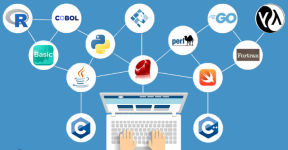Computer languages are the means through which humans communicate instructions to machines. They serve as the backbone of software development, enabling us to build websites, mobile apps, games, operating systems, and even smart devices.
A computer language can be broadly categorized into programming languages, markup languages, query languages, and machine languages. Each of them plays a specific role in instructing computers to execute tasks efficiently and accurately.
Without computer languages, there would be no internet, no applications, and no digital transformation. They form the syntax of the modern age.
Each of these languages has its syntax, use cases, advantages, and challenges.
Different projects require different languages. Often, developers need to be familiar with more than one.
Some modern languages (like Java) use bytecode and a virtual machine (JVM), combining both approaches for balance between performance and portability.
Learning a computer language not only boosts your career prospects but also improves logical thinking and problem-solving skills. It enables you to:
With demand growing for tech professionals in nearly every field, computer literacy — including coding — is no longer optional, it’s essential.
Computer languages are the core of every digital innovation you see today — from banking apps to healthcare systems and smart homes. Mastering them unlocks the ability to create, innovate, and shape the future.
Whether you're just starting out or looking to advance in tech, choosing the right language to learn and applying it in real projects is the gateway to success.
Which programming language do you think will dominate the next decade — Python, JavaScript, or something completely new?
Also, should everyone learn a bit of coding, regardless of their profession?
Let’s hear your thoughts!
A computer language can be broadly categorized into programming languages, markup languages, query languages, and machine languages. Each of them plays a specific role in instructing computers to execute tasks efficiently and accurately.
Without computer languages, there would be no internet, no applications, and no digital transformation. They form the syntax of the modern age.
Types of Computer Languages
- Low-Level Languages:
- Include machine language and assembly language.
- Directly interact with hardware.
- Used in systems where performance and hardware control are critical (e.g., embedded systems).
- High-Level Programming Languages:
- Easier for humans to write and understand.
- Examples include Python, Java, C++, JavaScript, and Ruby.
- Used in app development, data science, artificial intelligence, and more.
- Markup Languages:
- Define how text is displayed or structured.
- Common examples: HTML, XML.
- Essential for web development.
- Query Languages:
- Used to extract and manipulate data from databases.
- Example: SQL (Structured Query Language).
- Scripting Languages:
- Automate tasks within software environments.
- Examples: Python, Bash, Perl.
Each of these languages has its syntax, use cases, advantages, and challenges.
Popular Programming Languages and Their Use
- Python: Widely used in AI, machine learning, data science, and automation due to its simplicity.
- Java: Known for portability and security, used in Android apps and enterprise systems.
- JavaScript: The king of frontend web development; also used in backend with Node.js.
- C/C++: Great for system-level programming, high-performance apps, and game development.
- SQL: Essential for data handling and business intelligence tasks.
Different projects require different languages. Often, developers need to be familiar with more than one.
Compiled vs. Interpreted Languages
- Compiled languages (e.g., C, C++) are translated into machine code before execution. They are faster but require manual compilation.
- Interpreted languages (e.g., Python, JavaScript) run directly via interpreters and are easier to debug during development.
Some modern languages (like Java) use bytecode and a virtual machine (JVM), combining both approaches for balance between performance and portability.
Why Learn Computer Languages?
Learning a computer language not only boosts your career prospects but also improves logical thinking and problem-solving skills. It enables you to:
- Build apps, games, or websites
- Automate repetitive tasks
- Analyze data
- Create AI models or IoT systems
- Understand how computers really work
With demand growing for tech professionals in nearly every field, computer literacy — including coding — is no longer optional, it’s essential.
Current Trends in Programming
- Low-code/No-code Platforms: Democratizing software development for non-programmers.
- AI-Powered Coding Tools: GitHub Copilot and similar tools assist in writing code faster and with fewer errors.
- Cross-platform Development: Languages like Dart (Flutter) are used to build apps for web, iOS, and Android from a single codebase.
- Functional Programming: Gaining popularity for better handling of complex systems with immutable data and pure functions.
Conclusion
Computer languages are the core of every digital innovation you see today — from banking apps to healthcare systems and smart homes. Mastering them unlocks the ability to create, innovate, and shape the future.
Whether you're just starting out or looking to advance in tech, choosing the right language to learn and applying it in real projects is the gateway to success.
 Invitation to Discussion:
Invitation to Discussion:
Which programming language do you think will dominate the next decade — Python, JavaScript, or something completely new?
Also, should everyone learn a bit of coding, regardless of their profession?
Let’s hear your thoughts!

